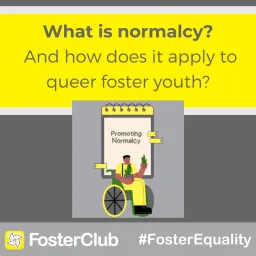The Foster Youth and Alumni Policy Council defines normalcy as the right of foster youth to regularly engage in extracurricular activities and “critical for establishing well-being for foster youth”. Without normalcy, foster youth can feel different from others, which impacts their ability to form lasting relationships and opportunities for healthy brain development.
“There are interminable arguments to make in favor of normalcy, but it should not take wonky jargon and neuroscience to treat foster children right”--former foster youth
LGBTQIA2S+ youth in foster care often face more obstacles to normalcy than their heterosexual peers due to experiences of discrimination, harassment, and rejection based on their SOGIE identity. The high rates of negative messaging about queer identities that queer youth experience while in care may result in the internalization of the stigma against them. Further, queer youth are also more likely to be placed in congregate care–settings where achieving normalcy is even more difficult than in foster family homes.
A 2014 federal law introduced the idea of “prudent parenting standards”, or a foster parent’s (or group home staff’s) right to choose what is best for foster youth in their care. In addition to engaging foster youth in extracurricular activities of the youth’s choosing, legal prudent parenting standards for LGBTQIA2S+ youth should also include parental education on the LGBTQIA2S+ experience in foster care, reviewing community peer support resources for queer youth, and proving an affirming and accepting environment for queer youth.
If you’re a foster parent of a queer young person and are ready to help them achieve normalcy, you’re in the right place! Check out these normalcy resources specifically for queer youth in care:
- The Children’s Bureau’s LGBTQ+ Normalcy Principles (this was written for child welfare agencies, but is relevant in foster homes too!)
- The Teen Success Agreement: a youth-developed written agreement that outlines the age-appropriate activities, responsibilities and life skills for youth ages 13-21 in the child welfare system, and how you as a foster parent can support those goals
- PFLAG has chapters of parents of queer youth across the country! Learn how to best support your queer foster youth and connect with other parents along the way.
- To find community supports for your queer foster youth, Lambda Legal’s state-by-state resource list is a great place to start.

